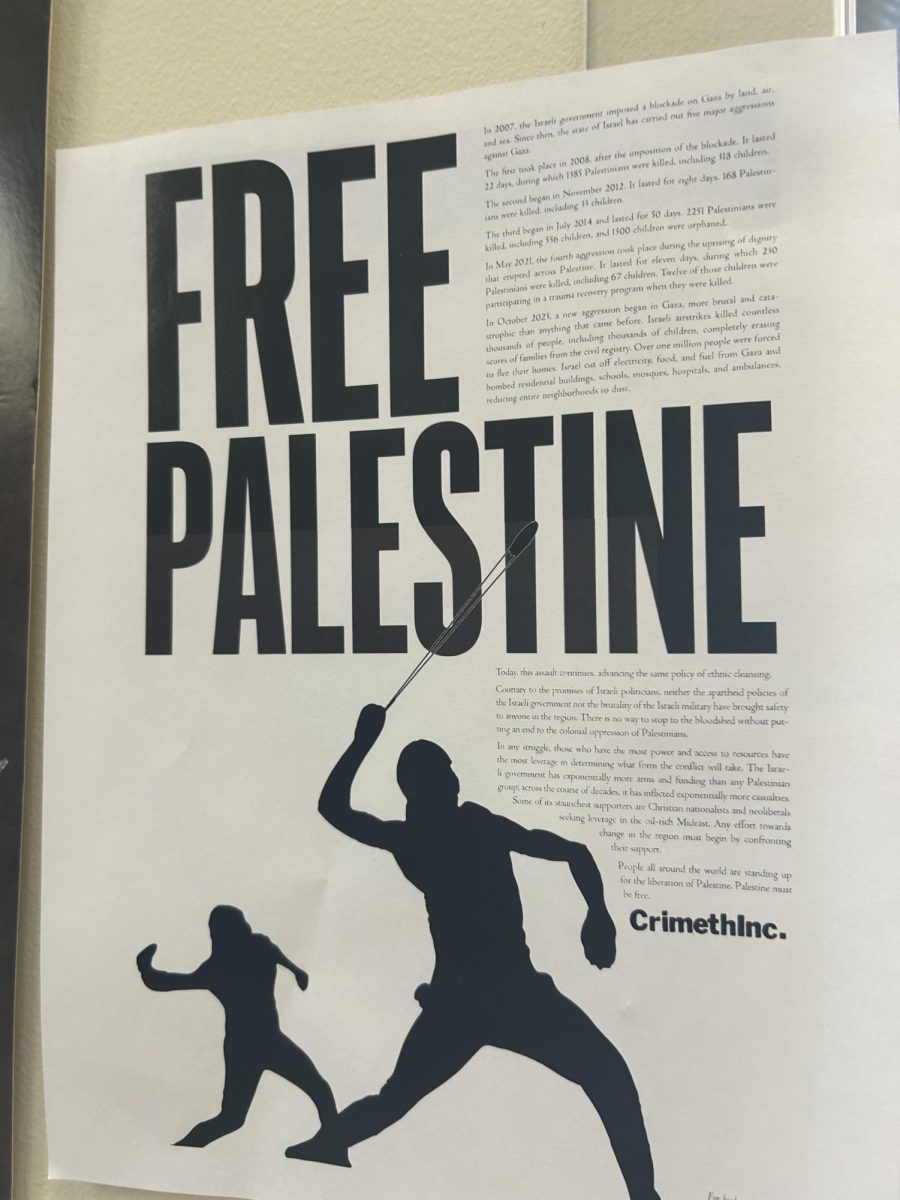Since the Israel–Hamas war began in October 2023, hundreds of protests have taken place on college campuses across the U.S. The responses of school administrations — from banning and suspending pro-Palestinian student groups to limiting demonstrations — have sparked debates over free speech at private schools. Now, these debates have been ignited at Lakeside.
On Thursday, February 15, students received an email from Upper School Director Mr. Boccuzzi explaining that the administration had “promptly removed” several “flyers about the war in Gaza” from the WCC, Student Center, and outside Moore Hall. Though his email did not specify what the posters said, Mr. Boccuzzi wrote that “the content … deeply harmed members of our community; students shared that they felt the information presented on the posters was unbalanced and out of context, resulting in them feeling invisible and unsupported.”
The posters were put up by the Black Student Union (BSU) in advance of a fundraiser the group was planning for the International Rescue Committee, an organization that aids people affected by humanitarian crises. In a February 13 email to the student body, the group wrote, “There are posters around the student center and WCC with information on a couple of these crises … BSU wants to use our platform during Black History Month to not only elevate our stories and voices, but also to speak on what is happening right now, globally, and help give a voice to those who are oppressed.” The other posters the BSU hung up for the fundraiser, which include flyers titled “Congo: Silent Genocide,” “Escalating Conflicts Within Ethiopia,” and “Sudan Conflict,” remain on the walls of the WCC and Student Center, though the fundraiser was eventually postponed.
Some members of BSU have expressed concern that their peers misinterpreted the posters as antisemitic and concluded that they hold antisemitic views by association. In an email to “Tatler”, BSU leaders clarified “our intention [for the Gaza posters]… was simply to provide historical background information on how places like Gaza became occupied and subsequently needed humanitarian aid, as we did in all the other posters.”
“Tatler” obtained images of the three removed posters. The first was titled “What is Genocide?” and contained the UN definition of genocide along with a paragraph suggesting that Israel is committing genocide; the second was titled “What Is Nakba?” and contained a definition of the term followed by commentary. The third and seemingly most controversial poster said “Free Palestine” and described “five major aggressions” Israel has “carried out…against Gaza.” The poster was printed directly from an organization called CrimethInc., which, according to its website, is “a rebel alliance — a decentralized network pledged to anonymous collective action — a breakout from the prisons of our age … ” The source is anonymous and no bylines appear on articles.
Mr. Boccuzzi learned of the Gaza posters on Wednesday evening, when he received several emails from concerned students and parents. The following morning, after viewing the posters in person, Mr. Boccuzzi, Dr. Bynum, and Director of Equity and Inclusion Profe Bensadon decided to take them down.
“We want to figure out … guidelines we can use as we enter into spaces where there are emotionally laden conversations … that are going to bring up different viewpoints for different people,” said Mr. Boccuzzi in a February 26 special assembly called to address the posters. “And so, when Dr. Bynum and Profe Bensadon and I were talking the Thursday morning before taking down those posters, we decided that we had not done our job effectively enough to prepare the community for that to be an entry point as students were walking into those public spaces to have this conversation [about the Israel–Hamas war].”
Responding to students concerned that the administration had censored pro-Palestinian sentiment, Mr. Boccuzzi said, “Looking back, I suppose it probably would have been more fair to take down every single poster and just say, ‘Hang on, we’re pausing on all of this.’ But the concern that morning and in the moment was, we know that this discourse in particular is one we are already trying to approach thoughtfully [and] haven’t set up well enough yet.”
Following the removal of the posters, students expressed their reactions and opinions.
Nathaniel R. ’24 said he was concerned by the wording and sources used in the posters. “It was very alarming to see very polarizing and frankly incorrect verbiage used in a poster that is for the school to see,” he said. “The administration was very thorough in getting them down … I don’t think they could have done anything quicker, which is really great.”
Nathaniel was also frustrated that the posters failed to mention Hamas. “It was a small sliver and not the whole picture,” he said. “It kind of felt like [the posters] were just not trying to put focus on the fact that Hamas is a terrorist group and part of their written [ideology] is to kill Jews and destroy the state of Israel.”
Other Lakesiders saw the posters differently. A student, who requested to remain anonymous citing fear of retribution from the administration, wrote to “Tatler”: “I thought that the posters were really informative and not one-sided at all, because it was all historical events and facts, and I don’t think those should ever be triggering. Also I feel like the school should allow students to have opinions and share them instead of trying to shut them down, and the school acted way out of proportion. I don’t think they should have been taken down because nothing in the posters was harmful, and the email was really misleading (they made it sound like the posters were hate speech and they didn’t include the posters [in the email] so a lot of students I talked to thought it was).”
From these drastically different perspectives on the accuracy of the posters, it is evident that Lakesiders have polarized opinions on the war in Gaza. When dealing with controversial subjects like this, Mr. Boccuzzi said that the school has learned that they need to “better develop” a policy on student political speech. “What I’m actually most interested in is [differentiating] between what is allowed to be posted on a wall and not signed by a specific person … versus what [is] actually encouraged and allowed in a face-to-face conversation or in a different space.”
Though the posters have been removed, Mr. Boccuzzi emphasized in his assembly speech that this does not mean the school wants to silence discussion of the war in Gaza and other global issues: “I want to make it clear that this is not an end point. This is not to say, ‘Great, so we’re done, we cleaned up that thing that happened before break.’ This is actually a beginning for us. To be talking and saying, ‘How do we do this? How do we do this better?’ And I hope you can tell I am open to and encourage the feedback if you have ideas.”


